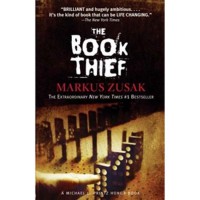Unimportant Musings
Where an amateur attempts at divining somewhat passable insights.
Currently reading
Book Review: The Book Thief

The Book Thief, in a possible oversimplification, amounts to Holocaust fiction narrated by Death. We follow him as he, in between doing his job, watches the activities of a young book-lover (little wonder now why it's so well-loved) called Liesel Meminger and her foster family whose home shelters a Jewish man in its basement from the Nazis. If that didn’t already sell me on the book, the gushing glee many of its readers have, along with their myriad animations and exclamation marks, heaped on to author Markus Zusak for gracing them with said book has certainly aroused my curiosity and bumped it up a few spots ahead in my reading priorities. My skepticism had me doubting their stamps of approval. My hindsight, after I devoured the book in three days, demands I now add my own.
Either I haven’t read enough books, a definite possibility, or Zusak actually writes that well. The man possesses an enviable knack for creating, with few words, such vivid and striking imagery that certain lines and passages left me sighing in appreciation: “In Liesel’s mind, the moon was sewn into the sky that night. Clouds were stitched around it.” Weird phrasing is commonplace and made me happier to come across than it had any right to: “He sat up a little higher and paused for a dozen silent sentences.” “The redhead reacted. Her freckles lengthened into commas. ‘But, Papa, look.’” Words and thoughts are given tangibility; they can be "shoved through… open window[s]," put on tables and looked at, emptied into sinks, seated on shoulders, and passed from hand to hand. Such quirks all worked for me, oddly enough, and added to the writing an entertaining dimension. And Death, whenever it suits him, shows he has a sense of humor: “Children were there, quick as, well, quick as kids gravitating toward a fight.” Speaking of whom, by the way, making Death the narrator has been dismissed by some as being distracting and gimmicky, as has Zusak’s writing for plopping here and there short asides in bold, and I can understand where they were coming from: most of the highlights I’ve made in my Kindle do not feature the character at all, though this passage made my day and me do a fist pump: "... her framed photo of Hitler was taken from the wall and thrown to the floor. The man was positively mugged and beaten to a glass-shattering pulp. I stepped on him on my way out.” The book well and truly won me over when the text gave way to the pictures and stories on painted-over pages of Mein Kampf, at which point I felt my inner child delightfully snapping to attention.
Zusak’s characters, from the Hubermanns and Rudy Steiner to Max Vandenburg and even Death himself, all made a great impression on me, and it was a real bummer to have reached the end and parted ways with them. Already, the book had me at hello with its inventive writing, but the relationships between the characters really gives it that extra kick I didn’t know it needed. With war being war, bad things abound, and Zusak doesn’t hold back on any of them, which he does thoroughly enough that the book should’ve come with a warning sticker, especially given that he set the stage so well with such lovable characters. It’s healthy, I think, to be have a little cynicism, as one may risk being made the fool otherwise, but Zusak comes very close in this book to snuffing it out by hugging it to death with examples of kindness (most notably via Hans Hubermann), of which we can be capable in the sorriest of times. I don't cry, which at times wasn’t for lack of trying, though I am not yet so far gone into heartlessness that I didn’t feel bursts of deep sadness on occasion.
 1
1




